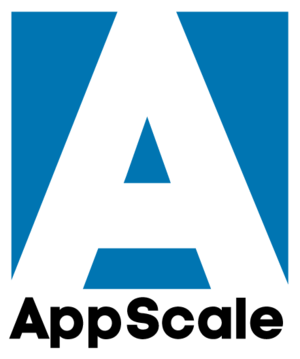AppScale GTS
 | |
| Developer(s) | Chris Donati, Tanvi Marballi, Chandra Krintz, Graziano Obertelli, et al. |
|---|---|
| Initial release | March 7, 2009[1] |
| Stable release | '2019(v3.8)'
/ 12 September 2019[2] |
| Repository | github.com/AppScale |
| Written in | Python, Ruby, Java, Go, PHP |
| Engine | |
| Operating system | Linux |
| Type | Serverless computing |
| License | Apache 2.0 |
![]() Search AppScale GTS on Amazon.
Search AppScale GTS on Amazon.
AppScale GTS is an open-source serverless computing platform that automatically deploys and scales unmodified Google App Engine applications over public and private clouds, as well as on-premises clusters.[3] AppScale GTS is modeled on the App Engine APIs and has support for Go, Java, PHP, and Python applications.[4]
The goal of AppScale GTS is to provide developers with a rapid, API-driven development platform that can run applications on any cloud infrastructure.[5] AppScale GTS decouples app logic from its service ecosystem to give developers and cloud administrators control over app deployment, data storage, resource use, backup and migration.[6]
The platform allows developers to focus on the business logic of building scalable applications, freeing them from the need to concentrate on deployment and scaling logic. AppScale GTS decouples app logic from its service ecosystem to give developers and cloud administrators control over app deployment, data storage, resource use, backup, and migration.[7]
AppScale GTS includes high-level APIs for persistence, asynchronous execution, distributed memory cache, user authentication, and more. It handles service discovery, load-balancing, fault-tolerance, and auto-scaling. It also allows IT operations and cloud administrators to provide a consistent, tunable environment for running and maintaining apps on multiple cloud infrastructures.[8] AppScale GTS was developed and maintained by AppScale Systems, Inc., based in Santa Barbara, California, and Google.[9]
History[edit]
AppScale began as a research project at the University of California, Santa Barbara Computer Science Department under the supervision of Professor Chandra Krintz.[10] The project was originally funded by the NSF, with additional funding from Google, IBM and NIH. In 2012, co-founders Dr. Chandra Krintz, Chief Scientist, Dr. Navraj Chohan, Development Lead, and Woody Rollins, CEO founded AppScale Systems to commercialize the private PaaS technology.
Open source components[edit]
- Datastore API: Apache Cassandra and Apache ZooKeeper
- Memcache API: memcached
- Task Queue API: RabbitMQ and Celery
- XMPP API: ejabberd
- Channel API: ejabberd
- Blobstore API: Apache Cassandra and Apache ZooKeeper
- Images API: Python Imaging Library (PIL)
- Cron API: Crontab
- HAProxy: HAProxy
Supported platforms[edit]
- Amazon EC2
- CloudStack
- DigitalOcean
- Eucalyptus
- Google Compute Engine
- Kernel-based Virtual Machine (KVM)
- Microsoft Azure
- OpenStack
- RackSpace
- SoftLayer (IBM)
- Xen
Supported languages[edit]
See also[edit]
External links[edit]
References[edit]
- ↑ http://downloads.appscale.com
- ↑ https://github.com/AppScale/
- ↑ AppScale Launches As An Open-Source Backup Equivalent To Google App Engine. TechCrunch (2013-06-24). Retrieved on 2013-09-18.
- ↑ Google App Engine Blog: Research Project: AppScale at University of California, Santa Barbara. Googleappengine.blogspot.com (2010-10-22). Retrieved on 2013-09-18.
- ↑ Darrow, Barb. (2013-06-04) AppScale’s mission: Making your mobile apps really mobile — Tech News and Analysis. Gigaom.com. Retrieved on 2013-09-18.
- ↑ [1]. Yahoo! Finance (2014-06-10). Retrieved on 2014-07-10.
- ↑ [2]. AppScale Systems (2018-03-09). Retrieved on 2018-03-09.
- ↑ [3]. AppScale Systems (2018-03-09). Retrieved on 2018-03-09.
- ↑ Lee, Justin. (2013-06-28) [4]. The WHIR. Retrieved on 2014-07-10.
- ↑ Urquhart, James. (2009-06-22) The new generation of cloud-development platforms | The Wisdom of Clouds - CNET News. News.cnet.com. Retrieved on 2013-09-18.
This article "AppScale GTS" is from Wikipedia. The list of its authors can be seen in its historical and/or the page Edithistory:AppScale GTS. Articles copied from Draft Namespace on Wikipedia could be seen on the Draft Namespace of Wikipedia and not main one.
